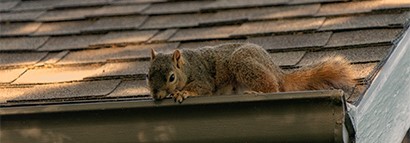Squirrel Control
Nuisance Squirrel Removal Services, When You Need It!
Humane Trapping & Exclusion
The Sciuridae family consists of tree squirrels, grounds squirrels, chipmunks, woodchucks, flying squirrels, and prairie dogs. Michigan is home to nine different squirrels, and the Eastern Chipmunk is the one most homeowners see running through their landscaping. Best Way Animal Removal can assist with removing squirrels, flying squirrels & chipmunks.
Identifying Squirrels
In Michigan, there are nine different squirrel species found. Squirrels vary in size and habitat preferences, but many can adapt to living in close proximity to humans. Seeds, nuts, fruits, flowers, clovers, insects, eggs, and even young birds are all eaten by squirrels.
Some squirrels hibernate during the winter. Squirrels come in nine different species in Michigan. Squirrels such as the fox, gray, red, and flying squirrels build their nests and spend the majority of their time in trees.
Common Squirrel Species Michigan

- Eastern fox squirrel– The belly and chest are a yellowish-orange color. The tops are a rusty grayish-brown color. The buff-colored hairs on the long bushy tail are often visible.
- Eastern gray squirrel– Tree squirrels are of medium size. Their back fur varies in color from grizzled dark grey to pale grey, with red undertones. Their ears range in color from pale-grey to white.
- Flying Squirrels– They are covered in a thick layer of very soft, dark brown fur. Their underbellies are white only at the tips, with a lead-colored base close to the skin.
- Red Squirrel– A small squirrel with a white or cream underside and reddish to reddish-gray fur on top. It has white around the edges of its eyes. It has a shorter and bushier tail than other tree squirrels.
Habitat Of Squirrels
Gray squirrels, like most of Michigan’s squirrel species, prefer mixed deciduous forests or mature hardwood, but they can also be found in suburbs and cities. Gray squirrel populations are densest in large forested areas with trees that provide them with a diverse and plentiful supply of nut trees, such as oak, hickory, and walnut. These squirrels are most commonly found in densely forested areas near permanent freshwater sources. Despite their adaptability to various environments, Gray squirrels require trees with security and nesting cavities for reproduction, so they are not found in open grasslands or deserts.
What Attracts Squirrels To Your Home?
Animals of all kinds go where they can find food in a safe environment. Squirrels and chipmunks eat nuts, acorns, birdseed, insects, fungi, fruit, and vegetables, so if you have a bird feeder, nut or fruit tree, or vegetable garden, you’ve most likely already attracted rodents. If they find an entry point, these rodents can easily transition from your yard to your attic, leaving as needed to get food – assuming they don’t try to steal the food you already have inside.
Squirrels are preyed upon by a variety of animals. Hawks and owls are common predators, but rodents are also killed and eaten by foxes, cats, dogs, coyotes, weasels, and snakes. When the squirrels are not outside getting food, nesting inside a human home provides protection.
Squirrels enter homes for various reasons, one of which is to avoid the harsh winter weather. Squirrels do not hibernate in the winter, contrary to popular belief. They’re less visible because they’d rather stay in a warm nest than venture out in bad weather. Squirrels can enter your home through openings as small as 1.25 inches in diameter – and some argue even smaller – making it very easy for them to do so.
How To Prevent A Squirrel Infestation?
- Eliminate Food Sources (bird feeders, pet food outside, etc.)
- Examine your home’s exterior from entry points such as cracks in the foundation or missing roof shingles.
- Trim nearby trees so squirrels won’t jump from trees onto your roof.
- Don’t feed squirrels (they will continue to return for food).
- Contact wildlife removal experts to install steel vent cover to prevent rodents from gaining access via chimneys and vents.
- Install fencing around gardens/crops.
Signs Of Squirrels
Like many other rodent species, Squirrels have become reliant on humans for food, water, and shelter. They don’t always make the best houseguests, unfortunately. Other infestation signs include squeezing and scurrying noises behind walls or above ceilings, scratching, chew marks, opened food, and waste trails.
Squirrel Damage To The Home

If you’re worried about squirrels making your house their home, keep an eye, ear, and nose out for some of the most common signs of squirrels in the attic or the walls. They are as follows:
- Increased rodent activity on the exterior of the property
- Unusual noises
- Entry points that have been chewed or damaged
- Odor
- Insulation, ductwork, soffits and fascia, roofing, and other areas may be damaged.
- Nests
- Feces/Urine
Squirrel removal (or even carcass disposal) may be necessary if you notice one or more of these signs. To be sure, contact a professional animal control specialist as soon as possible.
Diseases Associated With Squirrels
Squirrels are known to carry various diseases, but only a few of them are harmful to humans. Tularemia, typhus, plague, and ringworm are among the most common. Infected squirrels can transmit diseases to humans through bites or other forms of direct contact. Tularemia, typhus, and plague have flu-like symptoms and can be fatal if left untreated. Squirrels are rarely rabid, although all mammals are susceptible to rabies.
Other diseases that squirrels transmit to humans are caused by parasites that they carry. Squirrels near homes are rife with parasites such as fleas, ticks, and mites, and they frequently pass these tiny pests on to humans and pets. Encephalitis and Lyme disease are common diseases that parasites can cause in humans.
Rodent Control & Prevention Options

Our wildlife expert will determine the most effective and humane way to remove the squirrels or from your property when performing rodent removal. Live trapping, one-way doors, deterrents, and direct capture are the most commonly used techniques.
Adult squirrels are difficult to capture because they move too quickly and can fit into such small spaces. If a baby is discovered in an attic, it will be removed by hand and relocated with its’ mother. If mom isn’t around and the babies aren’t old enough to survive independently, our wildlife experts will seek assistance from a local wildlife rehabilitation center.
The most effective way to keep squirrels or other wildlife out of your house is to use preventative exclusion. To prevent future entry after squirrel removal, all existing entry points must be sealed. Furthermore, we strongly suggest that you hire a maintenance company.
Squirrels can be prevented from entering or re-entering your home by taking precautions such as removing trees or tree branches on or near your roof. We also recommend that you don’t use bird feeders because they attract squirrels and other wildlife. To maintain a squirrel-free home, we recommend that all of our customers remove bird feeders if they are present.
Squirrel Removal Process
- A rodent removal specialist is sent to your home to inspect the property and identify entry points, what is attracting the animals, and form a removal plan.
- Depending on your specific infestation, the Best Way Animal Removal technician will either set live traps or install exclusion devices that allow the rodents to exit but prevent re-entry.
- After the rodents have been completely removed from the home, all entry points will be sealed.
- Finally, our wild animal removal expert will advise on damage needing repairs, options for clean-up, and exclusion devices that will deter future infestations.
Have Squirrels Invaded Your Attic?
Our Michigan squirrel removal experts at Best Way Animal Removal provide the best possible service to our customers. We’ll take care of any squirrel issues you have and make sure your home is squirrel-free. Contact one of our wildlife removal experts today at 616-836-4255 for assistance with Holland, MI squirrel problems.
Areas Serviced For Squirrel Removal & Prevention
Allegan County, MI
Allegan, Douglas, Fennville, Holland, Hopkins, Martin, Otsego, Plainwell, Saugatuck, South Haven, Wayland
Kent County, MI
Byron Center, Caledonia, Casnovia, Cedar Springs, Comstock Park, Cutlerville, East Grand Rapids, Forest Hills, Grand Rapids, Grandville, Kent City, Kentwood, Lowell, Northview, Rockford, Sand Lake, Sparta, Walker, Wyoming
Muskegon County, MI
Casnovia, Fruitport, Lakewood Club, Montague, Muskegon, Muskegon Heights, North Muskegon, Norton Shores, Ravenna, Roosevelt Park, Twin Lake, Whitehall, Wolf Lake
Ottawa County, MI
Allendale, Beechwood, Coopersville, Ferrysburg, Grand Haven, Holland, Hudsonville, Jenison, Spring Lake, Zeeland
